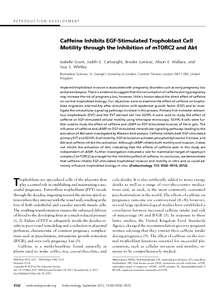Grant, I; Cartwright, JE; Lumicisi, B; Wallace, AE; Whitley, GS
(2012)
Caffeine Inhibits EGF-Stimulated Trophoblast Cell Motility through the Inhibition of mTORC2 and Akt.
ENDOCRINOLOGY, 153 (9).
4502 - 4510 (9).
ISSN 0013-7227
https://doi.org/10.1210/en.2011-1930
SGUL Authors: Cartwright, Judith Eleanor Wallace, Alison Elizabeth Whitley, Guy St John
![[img]](https://openaccess.sgul.ac.uk/100950/2.hassmallThumbnailVersion/4502.full.pdf)  Preview |
|
["document_typename_application/pdf; charset=binary" not defined]
Published Version
Download (1MB)
| Preview
|
Abstract
Impaired trophoblast invasion is associated with pregnancy disorders such as early pregnancy loss and preeclampsia. There is evidence to suggest that the consumption of caffeine during pregnancy may increase the risk of pregnancy loss; however, little is known about the direct effect of caffeine on normal trophoblast biology. Our objectives were to examine the effect of caffeine on trophoblast migration and motility after stimulation with epidermal growth factor (EGF) and to investigate the intracellular signaling pathways involved in this process. Primary first-trimester extravillous trophoblasts (EVT) and the EVT-derived cell line SGHPL-4 were used to study the effect of caffeine on EGF-stimulated cellular motility using time-lapse microscopy. SGHPL-4 cells were further used to study the effect of caffeine and cAMP on EGF-stimulated invasion of fibrin gels. The influence of caffeine and cAMP on EGF-stimulated intracellular signaling pathways leading to the activation of Akt were investigated by Western blot analysis. Caffeine inhibits both EGF-stimulated primary EVT and SGHPL-4 cell motility. EGF stimulation activates phosphatidylinositol 3-kinase, and Akt and caffeine inhibit this activation. Although cAMP inhibits both motility and invasion, it does not inhibit the activation of Akt, indicating that the effects of caffeine seen in this study are independent of cAMP. Further investigation indicated a role for mammalian target of rapamycin complex 2 (mTORC2) as a target for the inhibitory effect of caffeine. In conclusion, we demonstrate that caffeine inhibits EGF-stimulated trophoblast invasion and motility in vitro and so could adversely influence trophoblast biology in vivo.
| Item Type: |
Article
|
| Additional Information: |
PubMed ID: 22851680 |
| Keywords: |
Blotting, Western, Caffeine, Cell Line, Cell Movement, Epidermal Growth Factor, Female, Humans, Pregnancy, Proto-Oncogene Proteins c-akt, Transcription Factors, Trophoblasts, Science & Technology, Life Sciences & Biomedicine, Endocrinology & Metabolism, EPIDERMAL-GROWTH-FACTOR, ERBB SIGNALING NETWORK, NECROSIS-FACTOR-ALPHA, PROTEIN-KINASE, CYCLIC-AMP, ACTIVATION, INVASION, CANCER, RECEPTOR, RICTOR |
| SGUL Research Institute / Research Centre: |
Academic Structure > Molecular and Clinical Sciences Research Institute (MCS)
Academic Structure > Molecular and Clinical Sciences Research Institute (MCS) > Vascular (INCCVA) |
| Journal or Publication Title: |
ENDOCRINOLOGY |
| ISSN: |
0013-7227 |
| Related URLs: |
|
| Dates: |
| Date | Event |
|---|
| 1 September 2012 | Published |
|
| Web of Science ID: |
WOS:000308194900038 |
| URI: |
https://openaccess.sgul.ac.uk/id/eprint/100950 |
| Publisher's version: |
https://doi.org/10.1210/en.2011-1930 |
Statistics
Item downloaded times since 04 Mar 2013.
Actions (login required)
 |
Edit Item |


